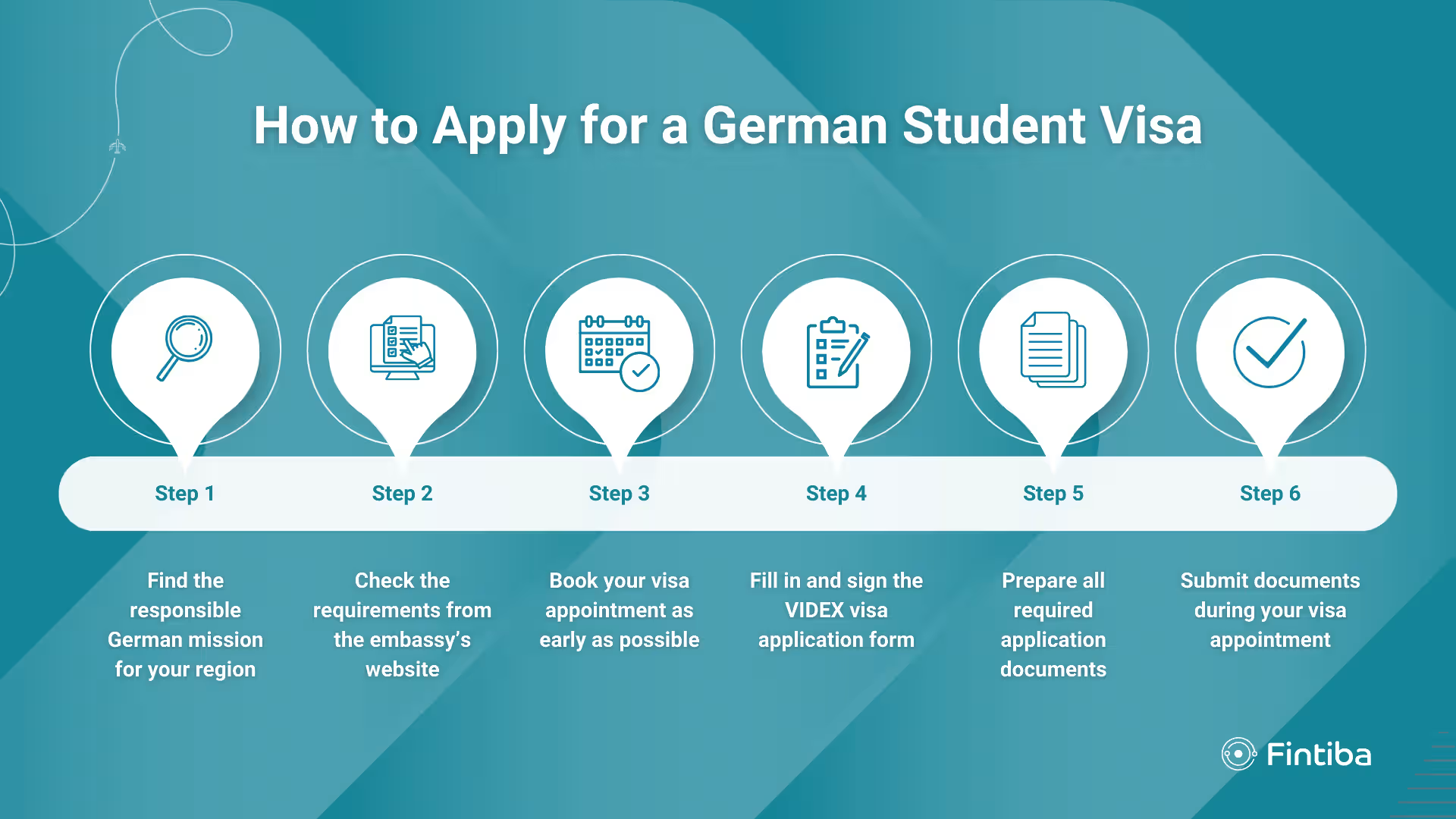
Almanya'da okumak birçok uluslararası öğrenci için bir hayaldir ve Almanya öğrenci vizesine başvurmak genellikle bunu gerçeğe dönüştürmenin ilk adımıdır. Bu vize size eğitim almak üzere Almanya'ya giriş için yasal hak tanır ve sizi Avrupa'nın en popüler eğitim destinasyonlarından birinde heyecan verici bir yaşama, öğrenme ve keşfetme yolculuğuna hazırlar. Nasıl çalıştığını, kimlerin ihtiyacı olduğunu ve nasıl başvuracağınızı anlamak, akademik yolculuğunuza güvenle başlamanıza yardımcı olacaktır.
Alman Öğrenci Vizesi Nedir?
Alman Öğrenci Vizesi, AB/AEA üyesi olmayan öğrencilerin üniversite eğitimlerini sürdürmek ve hatta yarı zamanlı çalışmak için Almanya'ya seyahat etmelerine olanak tanıyan resmi bir giriş iznidir. Kendi ülkenizdeki (veya yasal olarak ikamet ettiğiniz ülkedeki) Alman büyükelçilikleri veya konsoloslukları tarafından verilir ve eğitiminize başlamadan önce önemli bir gerekliliktir.
Alman Öğrenci Vizesinin Amacı ve Kapsamı
Öğrenci vizesinin temel amacı, tanınmış bir üniversitede okumak için Almanya'ya giriş yapmanıza izin vermektir. Bu vize aynı zamanda Studienkolleg (hazırlık kursu) gibi hazırlık kurslarını veya doğrudan lisans programınızla bağlantılı olması halinde yoğun dil kurslarını da kapsar.
Öğrenci Başvuru Vizesinden Farkı
Kabul durumunuza bağlı olarak, öğrenci vizesi yerine öğrenci başvuru vizesine başvurmanız gerekebilir. Öğrenci vizesine başvurmak için bir üniversiteden kabul mektubu almanız gerekirken, öğrenci başvuru vizesi bir Alman üniversitesine başvurmuş ancak henüz bir kabul mektubu almamış olan yabancılar içindir. Bunun nedeni, bir giriş sınavına girmeniz, Studienkolleg 'e katılmanız veya eğitimle ilgili bir dil kursuna katılmanız gerekmesi olabilir.
Vize Geçerliliği ve Giriş Türü
Alman öğrenci vizesi, "D vizesi" olarak da bilinen ulusal vize olarak sınıflandırılır ve genellikle 3-6 ay süreyle verilir. Almanya'ya vardıktan sonra, süresi dolmadan önce göçmenlik bürosuna(Ausländerbehörde) öğrenci İkamet izни için başvurmanız gerekir.
Hem öğrenci vizesi hem de öğrenci İkamet izни birden fazla girişe izin verir - yani Almanya'ya girip çıkma esnekliğine sahip olursunuz.
Almanya Öğrenci Vizesi Türleri
Uluslararası öğrenciler için farklı türde Alman öğrenci vizeleri bulunmaktadır ve hangisinin doğru olduğu, mevcut kabul durumunuza ve eğitim planlarınıza bağlıdır. Öncelikle Schengen Vizesi (C Vizesi) ile Ulusal Vize (D Vizesi) arasındaki farkı anlamak önemlidir:
- Schengen Vizesi (C Vizesi): 90 güne kadar süren kısa süreli kurslar için idealdir. Schengen Vizesi, Almanya'da bir derece almak isteyen uluslararası öğrenciler için geçerli değildir.
- Ulusal Vize (D Vizesi): Uzun süreli kalışlar için verilir ve eğitiminiz üç aydan uzun sürüyorsa ideal vizedir.
Ulusal Vize (D Vizesi) kategorisine giren 3 tür Alman öğrenci vizesi bulunmaktadır:
Alman Öğrenci Vizesi
Alman öğrenci vizesi (Visum zu Studienzwecken), bir Alman üniversitesinden resmi kabul mektubu almış ve bir derece programına (örneğin lisans, yüksek lisans, doktora) başlamak isteyen uluslararası öğrenciler için standart vizedir. Hazırlık kursuna (Studienkolleg) kabul edildiyseniz, Alman öğrenci vizesine de başvurabilirsiniz.
Alman Öğrenci Aday Vizesi
Alman öğrenci başvuru vizesi, bir Alman üniversitesine veya hazırlık kursuna başvurmuş ancak henüz kabul mektubu almamışsanız ideal vizedir. Resmi olarak kabul edilmeden önce giriş sınavına girmeniz veya mülakata katılmanız gerekiyorsa da öğrenci başvuru vizesine başvurabilirsiniz. Bu vize tam zamanlı eğitim almaya izin vermez, ancak Almanya'da bulunurken başvuru sürecini tamamlamanıza olanak tanır.
Almanca Dil Kursu Vizesi
Almanca dil kursu vizesi (Visum zum Spracherwerb), Almanya'da bir üniversitede okumak gibi bir planı olmayan, yoğun bir Almanca dil kursuna (haftada en az 18 ders) katılmak için Almanya'ya taşınan yabancılar için geçerlidir.
Kimler Alman Öğrenci Vizesine İhtiyaç Duyar?

Almanya'da eğitim görmek isteyen her uluslararası öğrencinin öğrenci vizesine başvurması gerekmez. Bu genellikle uyruğunuza ve ikamet ettiğiniz ülkeye bağlıdır.
Uyruğa Göre Vize Gereklilikleri
Alman öğrenci vizesine ihtiyacınız olup olmadığı esas olarak vatandaşlığınıza bağlıdır. Almanya başvuru sahiplerini üç ana gruba ayırır:
Üçüncü Bir Ülkeden Başvuru Yapmak
Kendi ülkenizden başka bir ülkede yaşıyorsanız, Almanya öğrenci vizesi için oraya başvurabilirsiniz. Çoğu Alman elçiliği, o ülke için geçerli bir İkamet izни veya uzun süreli vizeye sahipseniz başvurunuzu kabul edecektir. Turist vizeniz varsa, kendi ülkenize geri dönmeniz ve oradan başvuru yapmanız gerekecektir.
Bazı büyükelçilikler sadece o ülkenin vatandaşları için öğrenci vizesi başvurularını işleme almaktadır, bu nedenle randevu almadan önce kurallarını kontrol etmeniz önemlidir. Başvurunuz kendi ülkenizden sorumlu elçiliğe yönlendirilebileceğinden, işlem süreleri de daha uzun olabilir.
Almanya Öğrenci Vizesi Gereklilikleri ve Uygunluk
Almanya öğrenci vizenizi güvence altına almak için belirli kriterleri karşılamanız ve eksiksiz bir belge seti hazırlamanız gerekir. Her şeyin düzenli olması sadece onay şansınızı artırmakla kalmaz, aynı zamanda gecikmelerin önlenmesine de yardımcı olur.
Uygunluk Kriterleri ve Tanınan Kabuller
Alman öğrenci vizesine hak kazanmak için şunları yapmalısınız:
- Bir Alman üniversitesinden resmi bir kabul mektubuna(Zulassungsbescheid) sahip olmak. Studienkolleg veya dil kursu gibi bir üniversite hazırlık kursu için kabul mektubu da kabul edilir.
- Eğitiminiz sırasında kendinizi mali olarak destekleyebileceğinizi, örneğin bir Bloke hesap aracılığıyla kanıtlayabilmeniz.
- Seyahat Sağlık sigortası yanı sıra kalışınız için geçerli Alman Sağlık sigortası Sağlık sigortası teminatına sahip olun
- Eğitim programınıza bağlı olarak Almanca veya İngilizce dil yeterliliğini kanıtlayın.
Gerekli Belgelere Genel Bakış
Alman öğrenci Vize başvurusu için gerekli belgeler büyükelçilikler arasında biraz farklılık gösterebilir, ancak genel olarak çoğu öğrencinin ihtiyacı olacaktır:
- Doldurulmuş ve imzalanmış Vize başvurusu
- En az 2 boş sayfası olan geçerli bir pasaport
- Son biometric pasaport fotoğrafları
- Bir üniversite eğitim programına, hazırlık kursuna (Studienkolleg) veya Almanca hazırlık kursuna kabul mektubu
- Lise bitirme sertifikası veya lisans diploması (yüksek lisans için başvuruyorsanız)
- Goethe-Institut veya IELTS gibi tanınmış kurumlardan alınan dil sertifikaları ( eğitim diline bağlı olarak İngilizce veya Almanca)
- Bloke hesap , taahhüt beyanı veya Burs yoluyla mali kaynakların kanıtı.
- Seyahatbelgesi Sağlık sigortası uzun süreli Sağlık sigortası onayı
- Motivasyon mektubu
- Tablo şeklinde bir özgeçmiş
İpucu: Yerel gereklilikler farklılık gösterebileceğinden, her zaman elçiliğinizin web sitesindeki tam kontrol listesini kontrol edin.
Finansal Kanıta Genel Bakış
Almanya öğrenci vizesine hak kazanmak için mali kaynaklarınızı kanıtlamanız önemli bir gerekliliktir. Bunun nedeni, Alman makamlarının, eğitiminiz sırasında kendinizi finansal olarak destekleyebileceğinizden ve yaşam masraflarınızı karşılayabileceğinizden emin olmaları gerektiğidir.
2025 yılında göstermeniz gereken standart tutar aylık 992 Avro'dur. Çoğu durumda, Vize başvurusu süreciniz sırasında yalnızca ilk yıl için mali durumunuzu kanıtlamanız gerekir. Bu, 11.904 € tutarında bir meblağı kanıtlamanız gerektiği anlamına gelir. Bunu yapmak için birkaç seçenek vardır:
- Bloke hesap: Bu en yaygın ve kolay kabul edilen yöntemdir. Paralar bir hesapta "bloke" edilir ve Almanya'ya vardıktan sonra aylık taksitler halinde serbest bırakılır. Bloke hesap ınızı Fintiba ile açmak hızlı, kolay ve tamamen dijital bir süreç sağlar.
- Burs: Burs ödül belgesi, geçim masraflarınızı karşılayabildiğinizi kanıtlamak için de kullanılabilir. Burs miktarının aylık en az 992 € olması gerekir, aksi takdirde kalan miktarı karşılamak için yine de bir Bloke hesap açmanız gerekecektir.
- Resmi yükümlülük mektubu:"Verpflichtungserklärung" olarak da bilinen bu mektup, Almanya'da ikamet eden bir kişiden alınan ve eğitiminiz süresince sizin tüm mali sorumluluğunuzu üstleneceklerini belirten bir teminat mektubudur. Genellikle gelirlerini kanıtlamaları gerekecektir.
Sağlık sigortası Genel Bakış
Yeterli Sağlık sigortası , uluslararası öğrenciler de dahil olmak üzere Almanya'da yaşayan herkes için zorunludur. Bu sigorta olmadan öğrenci vizesi, üniversite kaydı veya İkamet izни alamazsınız. İhtiyacınız olan sigorta türü yaşınıza, eğitim programınıza ve kişisel koşullarınıza bağlıdır:
- Seyahat Sağlık sigortası: Vize başvurusu aşamasında zorunludur. Varış tarihinizden itibaren en az 3 ay veya kamu veya özel Sağlık sigortası başlayana kadar geçerli olmalıdır.
- Kamu Sağlık sigortası: Bu, tam zamanlı bir eğitim programı için üniversiteye kaydolan ve 30 yaşın altında olan çoğu uluslararası öğrenci için standart seçimdir. Kapsamlı teminat sunar ve genellikle aylık 130 € civarındadır.
- Kamu Sağlık sigortası: 30'un üzerinde olan, bir dil kursuna devam eden veya Studienkolleg'e kayıtlı olan öğrencilerin genellikle özel sigortaya ihtiyacı olacaktır. Bu sigorta, kapsam ve maliyet açısından daha esnek olabilir.
Almanya Öğrenci Vizesi için Dil Yeterlilik Şartları
Dil becerileriniz, Almanya'da seçtiğiniz eğitim programını başarıyla takip edebileceğinizi kanıtladığı için Vize başvurusu önemli bir parçasıdır. Hangi dilin gerekli olduğu tamamen kursunuzun eğitim diline bağlıdır.
Eğer diplomanız Almanca ise, çoğu büyükelçilik vize başvurusu yaparken üniversitenin şartlarına bağlı olarak Avrupa Ortak Dil Referans Çerçevesi (CEFR) kapsamında en az B2 seviyesine sahip olduğunuzu kanıtlamanızı ister. Yaygın olarak kabul edilen sertifikalar şunlardır: TestDaF, DSH, telc Deutsch veya Goethe-Zertifikat.
Eğitim programınız İngilizce ise, genellikle bunun yerine İngilizce dil becerilerinizi kanıtlamanız gerekecektir. Yaygın olarak kabul edilen testler şunlardır: IELTS, TOEFL ve Cambridge English Qualification. Minimum puan üniversiteye ve programa bağlıdır, ancak çoğu durumda CEFR B2 veya C1'e eşdeğer bir puana ihtiyacınız olacaktır.
İpucu: Bir dil sınavına girmeniz gerekiyorsa, sonuçlarınızı vize randevunuzdan önce alabilecek kadar erken bir tarihte planlayın. Geçerli bir kanıt olmadan başvurunuz ertelenebilir veya reddedilebilir.
Fintiba ile Almanya Öğrenci Vizesi Sürecinizi Kolaylaştırın
Almanya öğrenci vizenizi almak karmaşık olmak zorunda değil. Fintiba'da, 300.000'den fazla uluslararası öğrencinin vize belgelerini hızlı, güvenilir ve %100 çevrimiçi olarak başarıyla hazırlamalarına yardımcı olduk.
Almanya Öğrenci Vizesi İhtiyaçlarınız İçin Eksiksiz Çözüm
Fintiba, öğrenci Vize başvurusu için her gereksinimi kapsayan hepsi bir arada bir paket sunar. Süreç boyunca size adım adım rehberlik ederek hangi belgelere ihtiyacınız olduğunu bildireceğiz. Ayrıca Bloke hesap ve Sağlık sigortası dünya çapındaki tüm Alman büyükelçilikleri tarafından onaylandığından emin olabilirsiniz. Her şey tek bir yerde olduğu için zamandan tasarruf eder, stresi azaltır ve vize onayınızı geciktirebilecek yaygın hatalardan kaçınırsınız.
Fintiba Plus: Bloke hesap + Sağlık sigortası Tek Pakette
Fintiba Plus en önemli vize gerekliliklerini hepsi bir arada bir pakette birleştirir:
- Tamamen uyumlu Bloke hesap
- 95 € değerinde ücretsiz seyahat Sağlık sigortası
- Alman Sağlık sigortası ihtiyaçlarınıza göre uyarlanmış Sağlık sigortası
Bu şekilde gerçekten önemli olan şeye odaklanabilirsiniz: Almanya'daki yeni maceranıza başlamak. Artık her şeyin yetkililer tarafından kabul edilip edilmeyeceği konusunda endişelenmenize veya farklı kaynaklardan vize belgeleri almaya çalışmanıza gerek yok. Fintiba ile hesabınızı ve sigortanızı çevrimiçi olarak kolayca oluşturabilir, öğrenci vizesi randevunuzdan önce içinizin rahat olmasını sağlayabilirsiniz.
Alman Büyükelçilikleri Tarafından Kabul Edilen Hızlı Online Başvuru Süreci
Fintiba ile tüm süreç tamamen dijitaldir. Kaydınızı gönderin, belgelerinizi doğrulayın ve resmi Bloklama onayı belgenizi hızlı bir şekilde alın - hepsi telefonunuzdan veya dizüstü bilgisayarınızdan. Online platformumuz dünya çapındaki Alman büyükelçilikleri tarafından tanınır ve Vize başvurusu daha hızlı, daha kolay ve daha güvenilir hale getirir.
Almanya Öğrenci Vizesine Nasıl Başvurulur?
Almanya öğrenci vizesi için başvuru süreci birkaç adımdan oluşur ve biraz zaman alabilir. Bu nedenle, sürece erken başlamanızı ve tüm yapılması gerekenler hakkında kendinizi bilgilendirmenizi tavsiye ederiz:

Sorumlu Alman Misyonunu Bulun
İlk adım, bölgenizden sorumlu Alman büyükelçiliğini veya konsolosluğunu bulmaktır. Bulunduğunuz yere bağlı olarak, ülkenizde bir(Gana gibi) veya daha fazla(Pakistan veya Bangladeşgibi ) büyükelçilik/konsolosluk olabilir. Bu durumda, ikamet ettiğiniz şehre en yakın olanı seçmeniz gerekir. Ülkenizde bir Alman misyonu bulunmayabilir ve başvurunuzu komşu bir ülkede bulunan ve ülkenizden de sorumlu olan bir büyükelçiliğe yapmanız gerekebilir.
Vize Randevusu Alın
Vize randevunuzu mümkün olduğunca erken aldığınızdan emin olun. Randevular genellikle hızlı bir şekilde dolduğundan ve işlemler biraz zaman aldığından, randevunuzu kabul mektubunuzu almadan önce planlamaya çalışmanızı öneririz.
Son dakika stresinden kaçınmak için randevu tarihini planladığınız seyahat tarihinden bir veya iki ay önce almayı hedefleyin. Büyükelçiliklerin sınırlı zaman aralıkları olduğunu unutmayın. Bir randevuyu kaçırırsanız, daha sonraki bir randevuyu beklemeniz gerekecek ve bu da Almanya'ya varışınızı geciktirebilecektir.
VIDEX Başvuru Formunu doldurun
VIDEX formu, Alman vizeleri için çevrimiçi bir başvuru formudur. Bu forma yerel Alman büyükelçiliğinizin veya konsolosluğunuzun web sitesinden erişebilirsiniz. Bu, Vize başvurusu için en önemli belgelerden biridir ve bu nedenle doğru bir şekilde doldurmak için zaman ayırmanız çok önemlidir.
Kişisel bilgilerinizi, üniversiteniz ve eğitim programınızla ilgili ayrıntıları, planlanan seyahat tarihinizi ve kalışınızla ilgili daha fazla bilgiyi doldurmanız gerekmektedir. Formu doldurduktan sonra çıktısını almanız ve imzalamanız gerekmektedir.
Biyometri ve Fotoğraf Gereklilikleri
Almanya öğrenci vizesi başvurunuzun bir parçası olarak, Almanya standartlarına uygun 2 adet biometric vesikalık fotoğraf da sağlamanız gerekmektedir. Fotoğraflar şöyle olmalıdır:
- Son 6 aydan itibaren
- Renkli ve açık renkli bir arka plana karşı
- Yüzünüzün tamamının net bir şekilde gösterilmesi (resmin %70-80'i) ve nötr bir yüz ifadesine sahip olmanız
- Boyut 35mm x 45mm
Zamanında ve başarılı bir başvuru süreci şansınızı artırmak için biometric uyumluluğu garanti eden profesyonel bir vesikalık fotoğraf hizmeti kullanmanızı öneririz.
Vize Mülakat Süreci
Tüm belgeleri topladıktan, VIDEX formunu doldurduktan ve bir randevu aldıktan sonra, bir sonraki adım vize görüşmesine veya randevusuna katılmaktır. Bu, büyükelçiliğin belgelerinizi doğrulamasına, tüm kriterleri karşıladığınızdan emin olmasına ve niyetinizi şahsen değerlendirmesine olanak tanır. Göz korkutucu görünebilir ancak ne bekleyeceğinizi bilmek sinirlerinizi yatıştırabilir ve kendinize güvenmenizi sağlayabilir:
- Randevuya gerekli tüm belgeleri elçiliğin web sitesinde listelendiği sırayla fotokopileriyle birlikte getirin ve bunları zımbalamayın.
- Bir konsolosluk memuru eğitim planlarınız, üniversite seçiminiz, mali durumunuz ve bazen de aile geçmişiniz hakkında sorular sorabilir.
- Tüm soruları dürüst, açık ve kendinizden emin bir şekilde yanıtlayın. Sık sorulan sorulara verilecek cevaplar üzerinde pratik yapmak stresi azaltmaya yardımcı olabilir.
- Düzgün giyinin ve randevunuza erken gelin.
Randevu sırasında, konsolosluk görevlisi sizi beklenen işlem süresi hakkında bilgilendirebilir veya ek belgeler talep edebilir. Onaylandıktan sonra pasaportunuz vize etiketinizle birlikte iade edilecektir.
Almanya Öğrenci Vizesi Ücretleri ve İşlem Süresi
Alman Öğrenci Vizesine başvururken, yalnızca evrak işleri açısından değil, aynı zamanda masraflar ve bekleme süreleri açısından da önceden plan yapmak önemlidir. Vize ücretleri tüm Alman misyonlarında standart olsa da, işlem süreleri başvurduğunuz elçilik veya konsolosluğa ve yılın zamanına bağlı olarak değişebilir.
Aşağıda, bütçenizi ve zaman çizelgenizi hazırlamanıza yardımcı olacak ayrıntılı bir döküm yer almaktadır.
Vize Ücreti ve Ödeme Yöntemleri
Alman Öğrenci Vizesi için standart ücret yetişkinler için 75 €'dur. Eğer 18 yaşından küçükseniz, ücret 37,50 €'ya düşmektedir. Bu tutarlar genellikle Alman misyonu tarafından belirlenen güncel Döviz Kuru esas alınarak başvuru yaptığınız ülkenin yerel para birimi cinsinden ödenir.
Çoğu durumda, ödemeyi yapmak için banka veya kredi kartınızı kullanabilirsiniz, ancak bazı elçilikler nakit parayı da tercih edebilir. Ayrıca ücreti vize randevunuzun olduğu gün de ödemeniz gerekmektedir. Başvurunuz reddedilse bile vize ücretlerinin genellikle iade edilmediğini unutmayın.
İpucu: Gün içinde ödeme sorunları yaşamamak için randevunuzdan önce ödeme seçeneklerini ve tam tutarı her zaman yerel Alman misyonunuzla teyit edin.
Ortalama İşlem Süreleri
Almanya öğrenci vizesi için işlem süresi, başvurduğunuz ülkeye, yılın zamanına ve başvurunuzun eksiksizliğine bağlı olarak değişir. Ortalama olarak, mülakatınız veya belgelerinizin teslim tarihinden itibaren 4-6 hafta sürebilir. Ancak, başvuruların yoğun olduğu aylarda (Temmuz-Eylül ve Ocak-Mart) bu süre uzayabilir. Çoğu durumda, başvurunuz onay için Almanya'daki göçmenlik makamlarına iletilir ve bu da işlem süresinde rol oynar.
İpucu: Süreci hızlandırmaya yardımcı olmak için iyi düzenlenmiş belgelerle birlikte eksiksiz bir başvuru gönderin.
Almanya Öğrenci Vizesine Ne Zaman Başvurmalıyım?
Almanya öğrenci vizesi için üniversite kabul mektubunuzu alır almaz başvurmanız en iyisidir. İşlem gecikmelerini hesaba katmak için genellikle planladığınız seyahat tarihinden en az 2 ay önce başvurmanızı öneririz. Bu şu anlama gelir:
- Yaz dönemi (Mart/Nisan) için başvuruyorsanız , başvurunuzu Ocak sonu ile Şubat başı arasında yapmayı hedefleyin
- Kış dönemi (Eylül/Ekim) için başvuruyorsanız, başvurunuzu Temmuz sonu ile Ağustos başı arasında yapmayı hedefleyin
İpuçları:
- Öğrenci vizesine zamanında başvurabilmenizi sağlamak için başvuru belgelerinizi mümkün olan en kısa sürede toplamaya başlayın.
- Hala bazı belgeleri bekliyor olsanız bile, bazı elçilikler vize randevunuzu önceden almanıza izin verir, sadece randevu tarihine kadar tüm belgeleri teslim edebileceğinizden emin olun.
Öğrenci Vizesi ile Almanya'ya Varış Sonrası

Almanya'ya vardıktan sonra, tam olarak yerleşip eğitiminize başlamadan önce tamamlamanız gereken birkaç önemli adım vardır. Bu formaliteler, yeni adresinizin kaydedilmesini ve kursunuz süresince uzun süreli İkamet izни olmasını sağlar.
Adres kaydı (Anmeldung)
Varıştan sonra yapmanız gereken ilk şeylerden biri, adresinizi yerel kayıt bürosuna(Bürgeramt veya Einwohnermeldeamt) kaydettirmektir. Bu işlem, konaklama yerinize taşındıktan sonraki 2 hafta içinde yapılmalıdır.
- Neden önemli: Adres kaydı , Almanya'da banka hesabı açmak ve İkamet izни için başvurmak gibi birçok günlük işlem için gereklidir.
- Gerekli belgeler: Pasaportunuza, vizenize, kira sözleşmenize ve ev sahibinizden imzalı bir onaya ihtiyacınız olacak (Wohnungsgeberbestätigung).
Kayıt işlemini tamamladıktan sonra,"Meldebestätigung" adı verilen ve adresi başarıyla kaydettiğinizi doğrulayan bir belge alacaksınız.
İkamet izни Öğrenci İkamet izни Almak
İlk öğrenci vizeniz geçicidir ve genellikle 3-6 ay süreyle geçerlidir. Bu nedenle, vizenizin süresi dolmadan önce yerel göçmenlik makamınıza(Ausländerbehörde) öğrenci İkamet izни için başvurmanız gerekecektir. Bekleme süreleri uzun olabileceğinden, adresinizi kaydettirdikten hemen sonra randevu almak en iyisidir.
Ayrıca bu başvuru sürecinde birkaç belge sunmanız gerekecektir:
- Vize damganızın bulunduğu pasaportunuz
- Biometric pasaport fotoğrafları
- Üniversite kayıt belgesi
- Fon kanıtı (örn. Bloklama onayı)
- Sağlık sigortası onayının ispatı
- Şehir tescil belgesi(Meldebestätigung)
Öğrenci İkamet izни genellikle bir seferde en fazla 2 yıl için verilir ve eğitiminize devam ettiğiniz sürece yenilenebilir.
Almanya Öğrenci Vizesi Reddinin Yaygın Nedenleri
Almanya'nın yüksek vize onay oranlarına rağmen - 2024'te yaklaşık %90 - vize reddi yine de meydana gelebilir. En yaygın nedenleri anlamak, kendinizden emin bir şekilde başvurmanıza yardımcı olabilir ve başarı şansınızı önemli ölçüde artırabilir. İşte bunlar kaçınılması gereken bazı yaygın hatalar:
- Eksik veya hatalı belgeler
- Mali imkanların yetersizliği
- Yanlış Sağlık sigortası kapsamı
- Zayıf motivasyon mektubu
- Yetersiz dil becerileri
- Kötü mülakat performansı
SSS
Almanya vizesi hakkında sık sorulan soruların yanıtlarını bulun.
Almanya'da Öğrenci Vizesi İçin Yeni Kurallar Nelerdir?
Almanya öğrenci vizesi için yeni bir kural, uluslararası öğrencilerin yılda çalışabilecekleri gün sayısının 140 tam gün veya 280 yarım güne çıkarılmasıdır. Bu kural, Mart 2024'ten itibaren geçerli olacaktır. Ayrıca, Eylül 2024'ten itibaren, yeterli mali kaynakları kanıtlamak için gereken miktar yıllık 11.208 avrodan 11.904 avroya çıkarılmıştır.
Almanya'ya Geldikten Sonra Atılacak İlk Adımlar Nelerdir?
Almanya'ya vardıktan sonra, tam olarak yerleşebilmeniz için birkaç formaliteyi yerine getirmeniz gerekir. İlk 2 hafta içinde yeni adresinizi Şehir Kayıt Bürosuna (Bürgeramt veya Einwohnermeldeamt) kaydettirmelisiniz. Ardından, şahsen yapılması gereken işlemler varsa, üniversite kaydınızı kesinleştirin. Son olarak, Yabancılar Dairesine (Ausländerbehörde) öğrenci İkamet izни için başvuruda bulunun.
Almanya öğrenci vizesi için mülakat gerekli mi?
Evet, Alman öğrenci vizesine başvurmak için mülakata girmeniz gerekebilir. Belgelerinizi doğrudan bölgenizdeki Alman büyükelçiliği/konsolosluğuna teslim etmeniz gerekiyorsa, vize memuru size eğitim planlarınız ve Almanya'da okumaya karar vermenizin nedenleri hakkında birkaç soru soracaktır.
Almanya Öğrenci Vizesi Almak Zor mu?
Almanya için vize onay oranı %90 olduğundan, Almanya öğrenci vizesi almak genellikle zor değildir. Eksiksiz belgeler, gerçek çalışma planları ve uygun mali kanıtlarla, vize alma şansınızın çok yüksek olduğundan emin olabilirsiniz.
Almanya Öğrenci Vizesi İçin Ne Kadar Para Gerekiyor?
Öncelikle, Almanya'daki yaşam masraflarınızı maddi olarak karşılayabileceğinizi kanıtlamanız gerekir. İhtiyaç duyulan standart miktar aylık 992 Avro olup, ilk yıl için 11.904 Avro'dur. Bu kanıtı sağlamak için Bloke hesap, Burs onayı veya Almanya'da ikamet eden birinden resmi bir yükümlülük mektubu gibi seçenekler bulunmaktadır. Vize randevusu aldıktan sonra, bir yetişkin için 75 € veya 18 yaşın altındaki çocuklar için 37.50 € vize ücreti ödemeniz gerekecektir.
Almanya Öğrenci Vizesi Almanın Maliyeti Ne Kadar?
Öğrenci vizesi için vize işlem ücreti yetişkinler için 75 € ve küçükler için 37,50 €'dur. Bu tutar genellikle Alman büyükelçiliği veya konsolosluğunda yerel para birimi cinsinden ödenir.
Almanya Öğrenci Vizesi Ne Kadar Süre Geçerlidir?
İlk vize 3-6 ay için geçerlidir. Almanya'ya vardığınızda, genellikle en fazla 2 yıl geçerli olan ve yenilenebilen bir öğrenci İkamet izни başvurmanız gerekir.
Almanca Öğrenci Vize başvurusu Ne Kadar Sürer?
Almanya öğrenci vizesi için işlem süresi, elçiliğin iş yüküne ve belgelerinizin ne kadar eksiksiz olduğuna bağlı olarak genellikle 4-6 hafta arasında değişmektedir. Her zaman üniversite kabul mektubunu alır almaz başvuruya başlamanızı öneririz.
Almanya Öğrenci Vizesi Nasıl Alınır?
Almanya öğrenci vizesi almak için önce bir Alman üniversitesine başvurup kabul mektubu almanız gerekir. Ardından Almanya öğrenci Vize başvurusu hazırlamanız gerekir: mali durum belgesi (örneğin Bloke hesap), Alman Sağlık sigortası, akademik kayıtlar, motivasyon mektubu ve dil sertifikaları. Son olarak, Almanya öğrenci vizesine başvurmanız, randevu almanız ve randevu sırasında vize ücretini (75 €) ödemeniz gerekir.
Reşit Olmayanların Ekstra Belgelere İhtiyacı Var mı?
Evet, 18 yaşından küçükseniz ve Almanya öğrenci vizesine Vize başvurusu , aşağıdaki ek belgeleri sağlamanız gerekecektir: ebeveyn(ler)inizden veya yasal vasinizden noter onaylı muvafakatname, doğum belgeniz ve ebeveyn(ler)iniz veya vasiniz tarafından imzalanması gereken Vize başvurusu formu.
Burs Varsa Bloke hesap İhtiyacım Var mı?
Standart tutarın tamamını (aylık 992 €) karşılayan bir Burs onayınız varsa, Bloke hesap aba ihtiyacınız olması gerekmez. Burs tutarı bundan az ise, kalan tutarı karşılamak için bir Bloke hesap açmanız gerekecektir.
Alman Öğrenci Vizesi Sağlık sigortası ihtiyacım var mı?
Evet, Alman öğrenci vizeniz Sağlık sigortası ihtiyacınız var. Öncelikle Vize başvurusu Almanya'daki ilk günleriniz Sağlık sigortası seyahat Sağlık sigortası ihtiyacınız olacak. Ayrıca, eğitiminiz başladığında sizi kapsayacak uzun vadeli Alman Sağlık sigortası kamu veya özel) belgesini de göstermeniz gerekecek.
Öğrenci Vizesi ile Almanya'da Çalışabilir miyim?
Almanya'da öğrenci olarak yılda en fazla 140 tam gün veya 280 yarım gün çalışabilirsiniz. Bunun için öncelikle yerel göçmenlik bürosundan (Ausländerbehörde) öğrenci İkamet izни almanız gerekmektedir.
Öğrenci vizem sona erdikten sonra Almanya'da kalabilir miyim?
Öğrenci vizenizin süresi dolduktan sonra Almanya'da kalmanız yasal olarak yasaktır. Öğrenci vizenizin süresi dolmak üzereyse ve henüz eğitiminizi tamamlamadıysanız, vizenizin süresini uzatmak için önceden başvuruda bulunmanız gerekir. Eğitiminizi tamamladıysanız ve örneğin iş aramak için Almanya'da kalmak istiyorsanız, öğrenci vizenizin süresi İkamet izни yeni bir iş arama İkamet izни için başvuruda bulunmanız gerekir.
Bloke hesap olmadan Öğrenci Vizesine Başvurabilir miyim?
Burs onayı veya taahhüt beyanı (Verpflichtungserklärung) gibi kabul edilen bir alternatif aracılığıyla mali imkanlarınızı kanıtlayabilmeniz koşuluyla, Bloke hesap olmadan öğrenci vizesine başvurabilirsiniz.
Almanya Öğrenci Vizesine Online Başvurabilir miyim?
Birçok büyükelçilik şu anda Vize başvurusu belgelerinin çevrimiçi olarak sunulmasına izin vermektedir. Ancak, yine de orijinal belgeleri sunmak, ücretleri ödemek ve muhtemelen konsolosluk görevlisiyle kısa bir görüşme yapmak için şahsen randevu almanız gerekir.
Vizeye Hazır Paketinizi Alın
İhtiyaçlarınıza göre hazırlanmış hepsi bir arada vize çözümümüzle Almanya yolculuğunuza başlayın.
İlgili Vize Kılavuzları
Almanya için farklı vize türlerini, gereklilikleri ve başvuru ipuçlarını kapsayan ek makaleleri keşfedin




